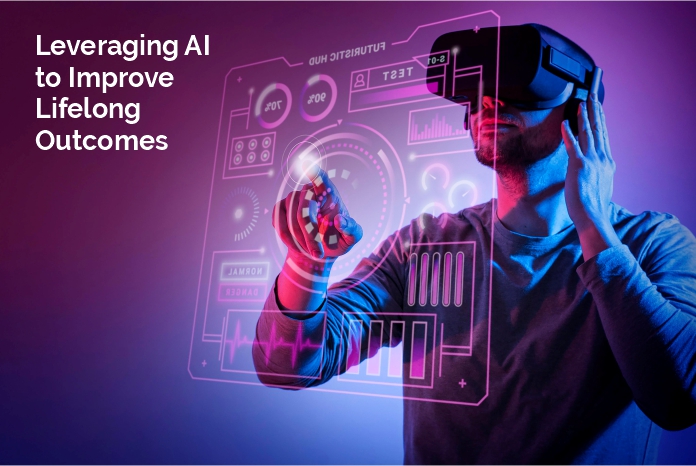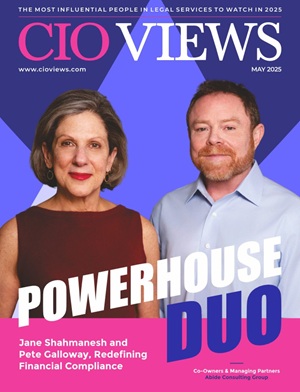
The Simplicity of Artificial Intelligence
Artificial Intelligence (AI) ‘s novelty and intrigue make it one of the most fascinating yet elusive technologies. This intrigue is what makes AI such an exciting and transformative technology across all industries and interests. After careful examination, many sectors (business, medicine, agriculture and education, to name a few) have innovatively enabled subtle pieces of AI. These subtle aspects of AI inside products and services have given many companies a very balanced approach to the world of AI without sacrificing their reputation with significant transformations with AI.
For some people, AI is a forbidden and unthinkable technology as they fear the displacement of jobs; or, worse yet, the entrance of the anti-Christ into people’s homes and minds. The reality is that artificial intelligence is much simpler than people fear or imagine. AI is only capable of learning repetitive patterns of behavior. In other words, my wife, to whom I have been married for 33 years, has far more intelligence on me than any technology called AI. She has watched my patterns of behaviors, attitudes, and responses for 12,410 days. In essence, she knows me better than I know myself. AI operates in the same manner. It is programmed to know us better than we know ourselves, but only from a repetitive behavioral perspective. AI will never be able to possess faith, hope, or love, which are the three core virtues of all people of faith.
AI is only suitable for routine functions that it has observed and tabulated over time. This reality should counter any negative things we have heard about AI and allows us to leverage AI for the very things that we keep forgetting to do. Married couples, for example, will always be capable of observing and remembering each other’s behavioral patterns better than anything or anyone outside of the marriage. The miracle of marriage is a simple one: couples do know one another better than they know themselves individually, and by loving and working together they enhance the godly force of faith, hope, and love significantly. This is beyond the reach of AI.
We all live within an evolving world with increasing responsibilities, tasks, relationships, and non-stop information. Wouldn’t it be helpful if we could separate the routine functions from the complex tasks? Our everyday repetitive tasks are estimated to consume 90% of our day. What if we could automate 90% of the repetitive tasks and perfect the 10% that truly matters. The 10% are the matters of the heart, which include faith, hope, and love. With such demanding schedules, it is no wonder that so many couples, children, and parents are prone to say things which later they wish they hadn’t. We all love the people involved in our lives but expressing this love can easily be squeezed out among all the routine tasks in front of us each day.
What if we could spend 90% of our time on the matters-of-the-heart while letting AI take care of all the common elements of life? This scenario is precisely the outcome of a happy marriage between two people who complement one another. What if we could live out the passage found in Proverbs 4:23, which states, “Guard your heart, for out of it flow the issues of life.” If we could do this, we would call Augmented Intelligence vs. Artificial Intelligence.
Augmented intelligence described in the paragraphs above would significantly reduce anxiety, stress, depression, disappointment, failures, and non-heart matters. It would allow us to focus on heart matters where all the real-life issues flow. In return, this would reduce the number of relationships concerns over petty issues and ultimately reduce marital problems.
Applying the Simplicity of AI to Education
In like manner, the global education scene is ripe to have AI resolve the everyday functions that cause less than 7% of the world’s population to have a college degree or certificate. 93% of the world have limited access to quality education, knowledge, intelligence, and wisdom. Even though we know that education can liberate people, access to these life-changing values lies behind the mundane routines required to complete educational degrees.
The journey to knowledge, wisdom, and truth is often hidden behind the laborious and expensive pathway associated with a 4-year degree. Thus students have to work longer and harder than necessary at every level of educational attainment, many of which are replete with hundreds of routine tasks like seeking financial aid, being located in the right geographical spot, being pre-qualified academically, not missing any deadlines, and following a litany of prerequisites.
However, not everyone has followed this academic pathway. The clearest example of a non-traditional journey is told by author Malcolm Gladwell, of Chris Langan[i] who possesses the highest IQ in the world. Chris Langan’s story is one of the millions of similar stories whose life circumstances have prevented them from achieving the next level of educational attainment. It is a classic yet often repeated journey that happened to the very person who possesses the world’s highest IQ. Malcolm Gladwell’s case study gives credibility to the belief that the top academic students are not necessarily the smartest. Instead, it demonstrates that they have become adept at following the rules and routine tasks required to excel. Both Dr. Trent Grundmeyer and Dr. Sam Varano, who earned Principal of the Year status in Iowa and Pennsylvania, have concluded that the best rule-followers often make the Valedictorian status. Suffice to say; the best rule follower is the person who has mastered the routine of the education system.
With AI capable of mastering the repeatable processes in life, it can remove the routines of the education systems, making everyone an academic success strory. Designed correctly, AI has the potential to liberate individuals to focus on the heart-and-mind matters of attaining the next level of education versus being overwhelmed by the routine tasks along the journey. These overwhelming everyday tasks cause many to drop the pursuit of the next level of educational attainment.
In early 2019, Oral Roberts University was part of designing an AI environment to accomplish the tasks required by students in a fresh new way. This new environment was called the AI-driven MQ-Mirror. The environment included a Smart TV with a surface mirror over the LCD panel on the TV. Inside the TV was an AI-enabled programmed mirror coding language that addressed numerous education challenges, which displayed suggested recommendations on the screen.
The AI intelligent Mirror application has been designed to bring the power of IQ, EQ, and now MQ (Mirrored Intelligence) together via a glass mirror. The mirror integrates a mini-processor, IoT, AI, a digital assistant, and the entire world’s digital ecosystem. Students can access all global cloud-based services and all campus services as a life-sized digital assistant.
The ability to program AI within the MQ-Mirror has created a test case to allow students to interact with the mirror and test their level of mental health and well-being. Using natural language programming, mirror coding language, and the AI capabilities of Amazon Alexa provides breakthroughs in creating an autonomous method to address mental health in a self-navigating manner. The concept of nudging students takes on a whole new meaning with the MQ-Mirror. Remember, AI can provide speech and text recommendations (nudging) based on the recurring pattern of behaviors.
For the first time in the history of education, students have an interactive smart mirror that can observe and reduce the routine tasks of any journey. It can also present observations from the student’s previous academic records to suggest study habits, patterns, and best outcomes.
The MQ-Mirror enhances the way humans interact with intelligence, while AI takes the burden of all routine tasks
The new application allows students to interact with personal data, global communications, self-navigation, self-help, data analytics, music, video, education, fitness, artificial intelligence, and robotic functionality via a glass mirror. The new form-factor of a glass mirror has all the attributes to engage human-to-digital-and-visual interaction fully. The glass mirror combined with the tiny new computer design hidden within the mirror frame has made significant advancements in personal fitness by combining the mirror, smartphone, and wearable watch. All three synchronized together to provide a premier digital experience that accesses personal data, AI, machine learning data, personal trainers, eCourses, and text to speech narration. The mirror itself provides the real-life experience of both virtual and augmented reality (Mirrored Reality).
The human fascination with a mirror combined with the emergence of AI, virtual digital assistants, machine learning, eLearning, and 5G connectivity allows real people to become front-and-center instead of the technology itself. Up to this point in the history of computers, the device has taken center stage. This mislabeling of advancements has caused many undesired social, physical, and psychological outcomes. We have allowed the labeling of technology 1.0, 2.0, 3.0, etc., versus a focus on civilization 1.0, 2.0, 3.0. CIO Magazine[i] has labeled this newly designed MQ-Mirror as the breakthrough service called XaaS, meaning ‘Everything-as-a-Service.[ii] It’s about time.
More about Dr. William Lyons and Michael L. Mathews
Dr. Lyons is a Professor in the College of Theology and Ministry at Oral Roberts University and teaches both on the graduate and undergraduate levels. He holds a Ph.D. in Religions of Western Antiquity from Florida State University, a M.A. in Hebrew and Semitic Languages from the University of Wisconsin, and a M.A. and B.A. in Biblical Studies from ORU. He has taught at Regent University (Virginia), Florida A&M University, Florida State University, and internationally in India, Guatemala, Russia, and South Africa. He teaches courses in Hebrew Bible/Old Testament, biblical and Semitic languages (Biblical Hebrew; Aramaic; Syriac; Ugaritic; Phoenician and Canaanite Dialects; and Akkadian), ancient Near Eastern history, Judaism, religion, and literature. He also serves as Co-Director (with Dr. James Shelton) of the ORU Scholars Initiative, the research arm of the Museum of the Bible. Whether teaching on campus or online, his classes routinely incorporate both digital and traditional pedagogy.
His particular research interests include warfare in the Bible and Just War studies; the history of Jewish and Christian biblical interpretation; Wisdom Literature; Psalms; and ancient Near Eastern history, culture, and archaeology. He has written on war in the Hebrew Bible (including herem, the so-called “holy war”); ancient Near Eastern thought; women in the Bible; Old Testament character ethics; biblical hermeneutics (including feminist, rabbinic, and modern evangelical perspectives); and Wisdom Literature.
Michael L. Mathews (Mike) has over 24-years of experience as a senior-level IT executive bringing creative solutions that value the end-users of technology and business process management. These solutions have benefited the end-users of higher education, manufacturing, and high technology company products. Mike spent 12-years working at Cray Research where he trained hundreds of supercomputer engineers across major industry sectors including the energy sector.
Michal has held positions as a VP of Innovation, chief information officer, general manager of CIOs, chief strategist for innovation, business development officer, trainer, teacher, and vice president of academic services for leading corporations and higher education. Mike has been a CIO within higher education and corporate training for over 19 years.
Michael was named the 2021 Leading Technologist by CIOViews, 2020 Top 20 Business Leaders by Industry Wired, 2019 Top Ten Innovators by Industry ERA, one of America’s Top 30 Education innovators in 2017, and a 2018 CIO 100 Award Winner. Many of Mike’s contributions can be viewed at: https://works.bepress.com/michael-mathews/




















